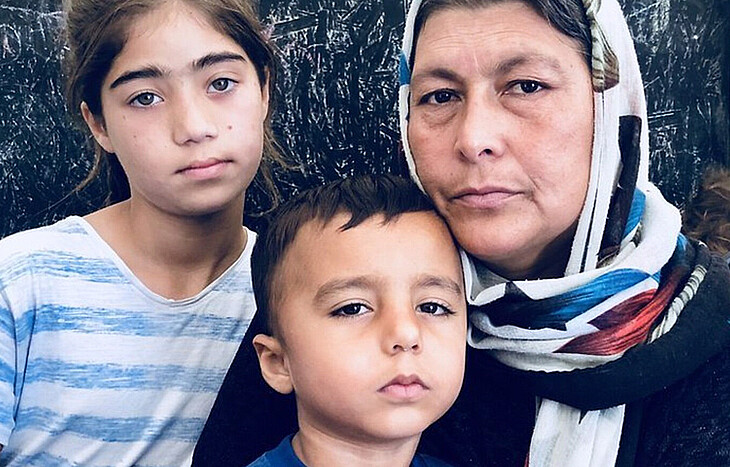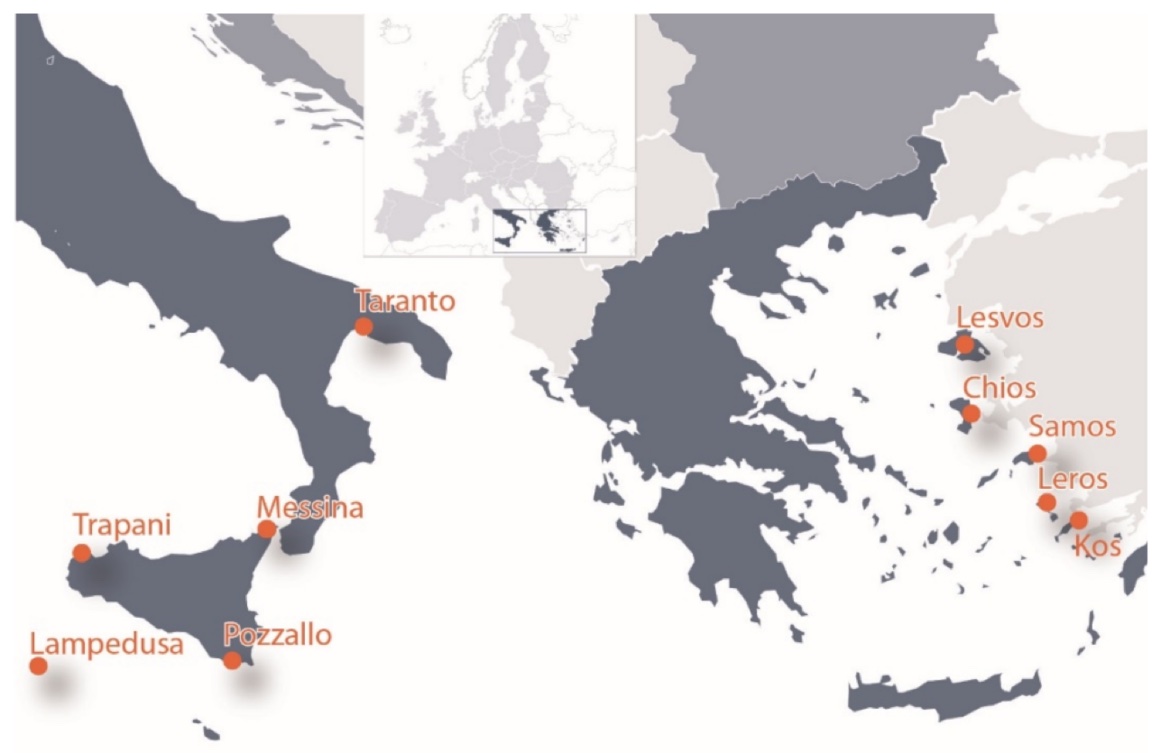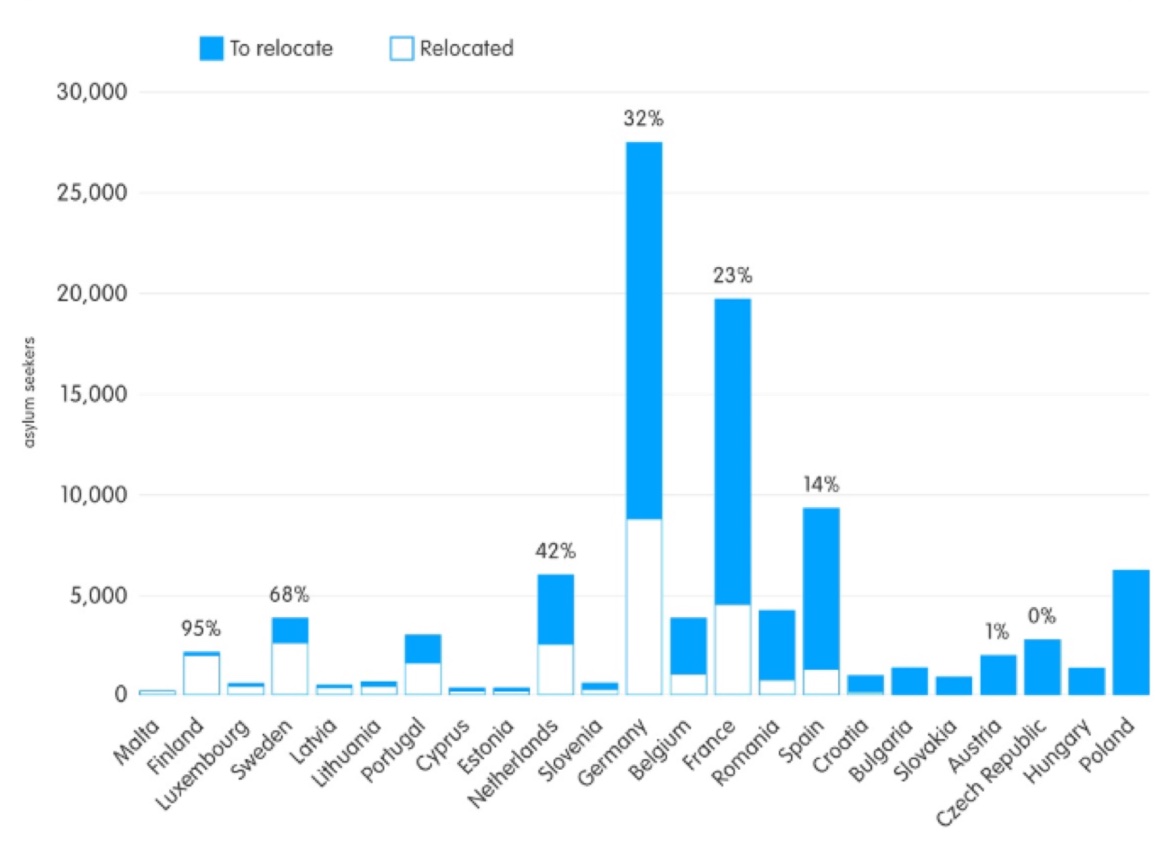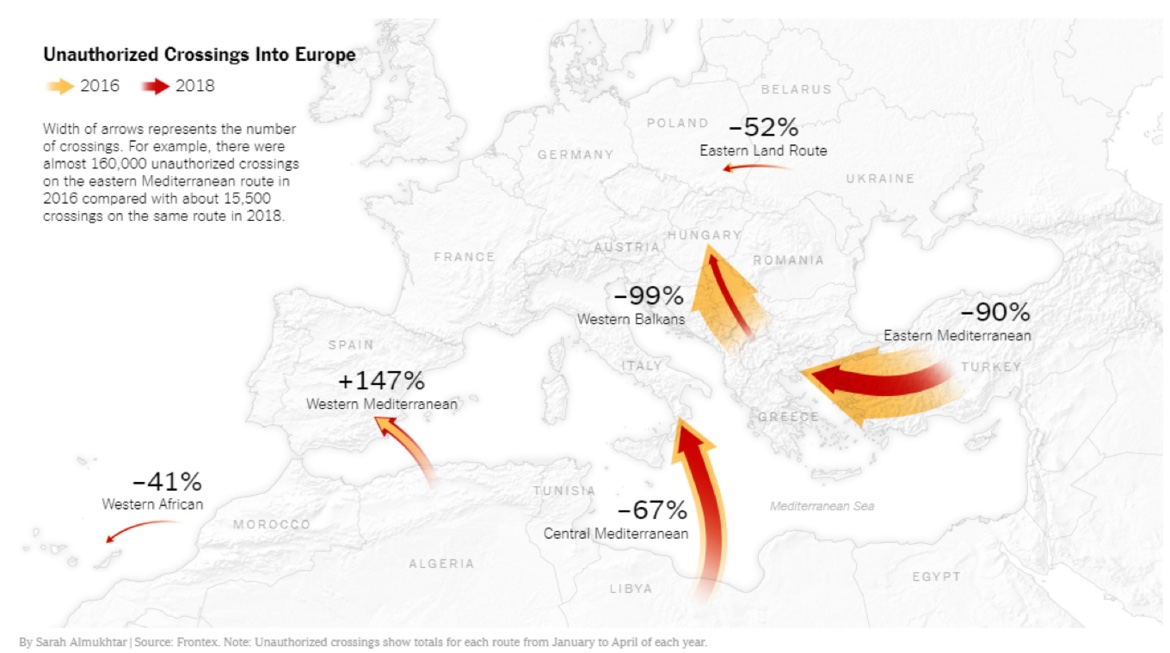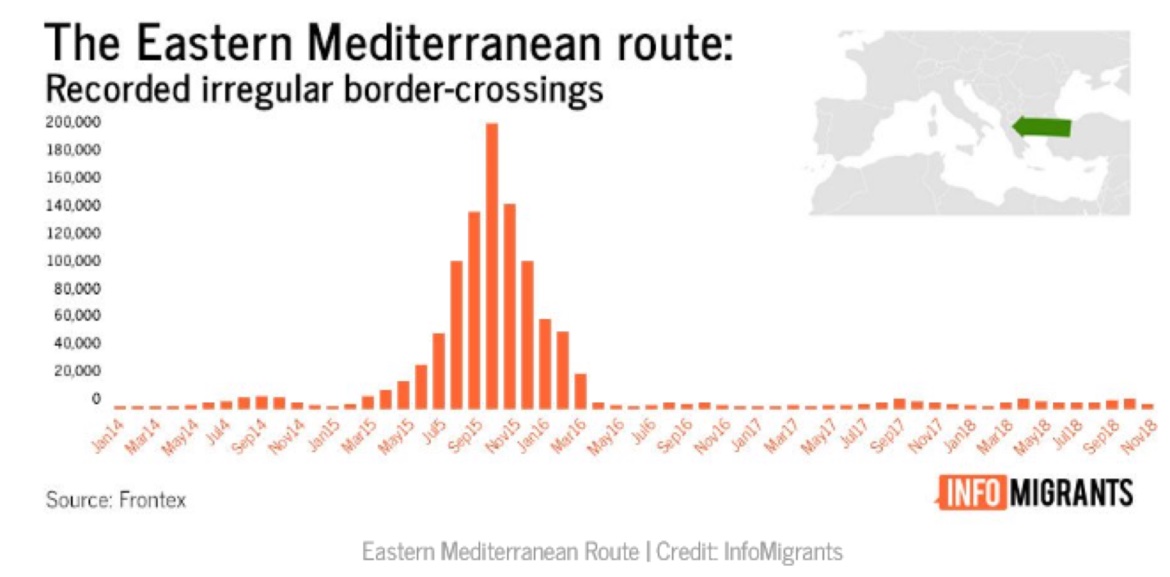The case
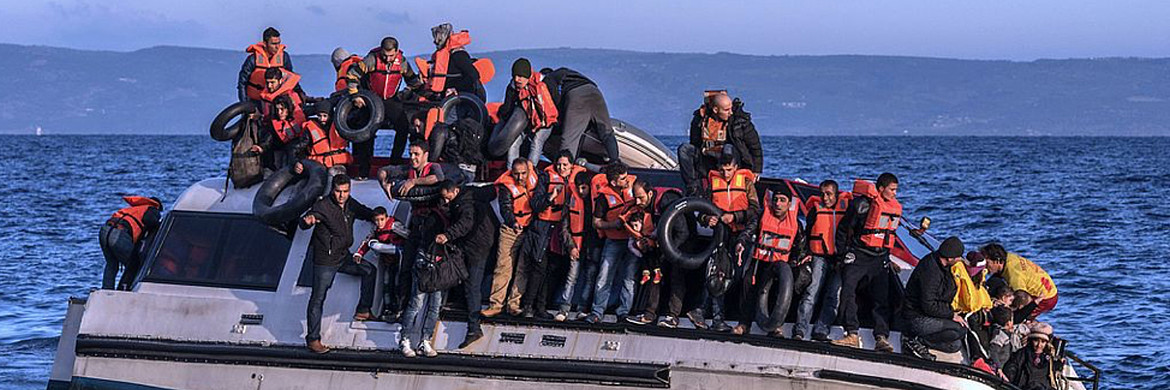
Introduction
It is September 2018 and Marios Andriotis Konstantios, Senior Advisor to the municipality of Lesbos in Greece, receives a phone call from Martijn Vroom, the Mayor of Krimpen aan den IJssel in the Netherlands. The two have been in contact since the refugee crisis in 2015. Both have experience hosting refugees: Krimpen was one of the first Dutch municipalities to offer emergency shelter to refugees arriving in the Netherlands, while Konstantios dealt with thousands of refugees arriving in his municipality in Lesbos. But it seems like the crisis is not over yet
Overcrowded to breaking point and with a shocking rise in violent incidents, the refugees in Camp Moria in Lesbos feel constantly unsafe (Appendix A). Doctors without Borders reports an “unprecedented health and mental health emergency” in the camp, and says that child refugees in particular “are increasingly attempting suicide, self-harming or having suicidal thoughts” [2]. The constant fear, combined with the experience of traumas and sexual abuse, accelerates mental health deterioration, say medical experts. Some people have been living in the camp for two years [3].For 9000 migrants in Moria, the Greek health ministry has provided only one physician [4]. Although 1350 refugees were transferred to the Greek mainland in August, some 115 new refugees arrive every day, compared to 85 last July [5].
On the phone to his counterpart Konstantios, Vroom gets to the point: “Look, I know Lesbos is really struggling, trying to house thousands of refugees on the island. I get that you have to deal with structural problems – international, European, national and local. The circumstances are difficult. But Mario, can you explain the crux of the story so that we can do something? I mean, what do we need for a viable and positive solution? And how we can we prevent a similar safety and security crisis in the future? Winter is approaching fast, and the lack of sanitation is appalling. So how can we offer short-term relief on one hand; and on the other hand, as I imagine we’ll have to deal with forced replacement crises in the future, let’s think in solutions.” [6]
Konstantios hesitates before coming up with an answer to Vroom’s almost impassioned appeal because he knows all too well how complex the situation is. So many actors involved – the EU, the Greek government, NGOs – and each with its own priorities and obstacles. What one party does will have consequences for the other, all trickling down to impact the life of people fleeing their countries. But it’s worth a try…
Background of European Migrant Crisis
In 2015, Europe was surprised by a large influx of people from Northern African and Middle-Eastern countries who sought refuge from war, incredibly unstable regimes or unsafe living conditions in their home country. The war in Syria especially led to an influx of Syrians seeking refuge and safety in neighbouring countries and in Europe (The Refugee Project), but large numbers of refugees from Iraq and Afghanistan also tried to reach Europe [7]
Although refugees were by no means a new phenomenon in Europe and global refugee crises occur more often (EarthTime), the crisis seemed to be loaded on Greece’s shoulders (with boatloads arriving in a constant stream), and got too big for Greece to handle. Lesbos, a Greek islands near Turkey, became a hotspot[a]for the refugees arriving in Europe; it was simply overwhelmed. In 2015, the island had 20,000 refugees waiting to be rehoused [8].
A number of significant events and issues influenced the influx of refugees into Europe and Lesbos specifically from 2015 onwards (Appendix B):
- 2015: In 2015, more than a million people in total crossed Greece, moving from the Aegean islands to mainland Greece, and from there, to other northern and central European countries [9]Their preferred route was the so-called Balkan Route (explore the routes in “Resources'). Then Hungary built a razor-wire fence at their Serbian border to stop them.[b]A photo of a drowned Syrian boy on a Turkey beach shocked Europe and became a symbol of a human plea for European countries to help. Angela Merkel, the German Chancellor, announced that Germany would have an open-border policy for the refugees. Many European countries suspended the Schengen system[c]by setting up border controls [10].
- 2016: The Balkan route was officially closed. Because of that, many migrants got stranded in Greece. More than 5000 people lost their lives in the Mediterranean Sea in the hope to reach a safe haven. In March 2016, the EU-Turkey deal is signed to decrease the influx of refugees.[d]
- 2017: Italy struck a deal with Libya for returning migrants and criticised NGOs for picking up boat refugees from the sea. Populist and anti-immigrant parties in Europe consolidated their position in some EU member states, while migrants are sold off at slave auctions in Libya.
- 2018: Fewer people arrived in Italy whereas the Western Mediterranean Route saw a threefold increase. Refugee camps on Greek islands started becoming overcrowded, and squalor and violence reach breaking point.
[a]Read more about the ‘hotspot approach’ in the section about the European Union, in “Explore the Stakeholders”.
[b]Three main routes (western, central, eastern) in which the Eastern Mediterranean Route through the Greek islands experienced a peak of almost 200,000 people arriving in September 2015 (Appendix G).
[c]The Schengen system enables free movement of people without border controls within the internal borders of the Schengen zone, and first came into being after the Schengen Conventions in 1985. In 2018, 22 EU member states plus Iceland, Norway, Switzerland and Liechtenstein were part of the Schengen zone.
[d]For a summarised explanation on the deal, check out the section about the European Union, in “Explore the Stakeholders”.
Challenge
A Simple Solution?
The stakeholders involved in the refugee issue on Lesbos all have different incentives, backgrounds and goals in this issue. Because of the different levels of politics, organisations, and people involved (e.g. international, national, local) the situation is complex and there might not be an obvious solution, at least this is what many people on different levels vocalise. However, the safety and security of the refugees in Lesbos, first and foremost, is at stake here. What do you believe needs to be done in order to alleviate the situation in Lesbos and the ripple effects related to it? And who is going to pay for it?
The Lesbos Story Continues…
Although the scale of the refugee crisis in Europe has declined in terms of numbers since 2015 (Appendix F),the issue is ongoing, with little expectation of being resolved at the time of compiling this case. In 2019, the crisis in the camps on Lesbos appears to be spreading to another Greek island, Samos. In April 2019, the Dutch NGO Movement on the Ground announces that it will expand its mission to Samos [60]. There are reports that the refugee camps on this island are similarly overcrowded, hosting 2-3 times their capacity [61]. Also, Greece has been met with criticism for legally underperforming on the EU-Turkey deal [62]. Meanwhile, as far-right political parties, such as Viktor Orban’s Fidesz in Hungary, continue to gain momentum in the polls, [63] the EU has been drawing on data and metrics (Appendix G) showing that the refugee crisis is over, as a counter argument to anti-immigrant political agendas.
Explore the stakeholders
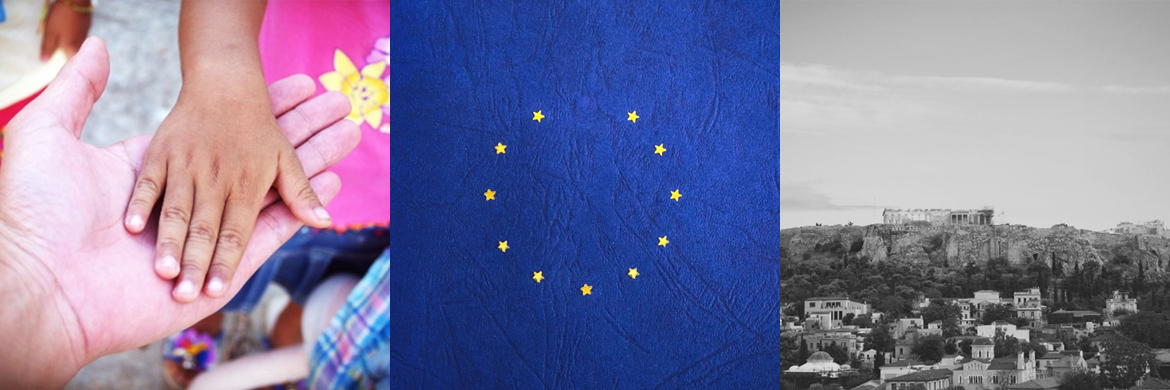
International Organisations
Two main international organisations that are involved in the refugee crisis: the International Organisation for Migration (IOM) and the United Nations High Commissioner for Refugees (UNHCR). IOM is funded by the European Commission and has supported the Greek government with, for instance, a hosting program for 6,000 people for 6 months [11].
The role of global organisation UNHCR in migration and forced displacement issues is to protect the rights of refugees, forcibly displaced communities and stateless people; to save their lives, and to improve their future [12]. Based on the 1951 Refugee Convention, states are expected to cooperate with UNHCR making sure that the rights of refugees are protected and respected. This right also ensures that refugees may not be returned to a country “where they face serious threats to their life or freedom” (non-refoulement) [13].
In Lesbos, the UNHCR has taken on the role of information provider for the refugees on arrival (e.g. their rights, obligations, asylum procedure, and legal counselling) [14]. Also, in 2018 the UNHCR assisted in transporting people from and to sea ports in Greece and organised ferry tickets with funding from the European Commission (EC) [15]. Greece as well as UNHCR housed refugees in reception sites and hotels on the mainland (approximately 54 asylum seekers’ hosting facilities outside urban centres [16].
But in August 2018, the UNHCR sounds the alarm about the situation in Moria camp on Lesbos and other refugee camps on neighbouring islands that are overcrowded.UNHCR expresses grave concerns about the physical and sexual violence that is happening on a daily basis in the camps, as well as the appalling sanitary conditions. The UNHCR reports that Moria camp is hosting some 6500 refugees while it only has space for 2000 [17].
European Union
The role of the European Union (EU) in the issue has been as follows: they have been working to provide legislation and funding to relieve and protect European member states since 1999, while needing to ensure the fundamental rights of the asylum seekers [18]. In April 2016, the EU decided on a holistic EU approach towards migration,[a]acknowledging the need to improve its return systems’ effectiveness. New EU readmission agreements for refugees should take preference over bilateral agreements with third countries, and member states that push back migrants from their own country without a proper asylum procedure can expect appropriate action from the EU. With regards to funding, the EU had projected it would need €300 million for crisis emergency support in Greece and other EU member states in 2016, and €200 in 2017 and 2018 respectively. In 2017, €500 million was set aside to “support member states’ resettlement efforts” [19].
EU decisions that influence the refugee situation in Lesbos:
- Hotspot Approach: The ‘hotspot approach’ was introduced by the European Commission in March 2015. The goal is to provide assistance to the EU member states that experience high migratory pressure. The goal of the hotspots is twofold: 1. Make it easier to distribute EU aid in areas where many refugees arrived. 2. Channel the flows of people arriving and their procedures of international protection and/or return. Both Italy and Greece have five hotspots (Appendix C)
- EU-Turkey StatementMarch 2016: This deal includes a ‘swap-agreement’ where “for every Syrian being returned to Turkey from Greek islands, another Syrian will be resettled from Turkey to the EU”. Also, every new irregular migrant crossing from Turkey to Greece should be returned to Turkey [20]. In addition, the refugees on Lesbos receive a geographical restriction at the island [21].
Results: The number of refugees arriving in Greece decreased after 2015, and, based on this target, the EU concluded that the agreement was a success. But while pressure on Greece was reduced, migrants still continued to cross to the Greek islands from Turkey [22]. The rate of deaths in the Mediterranean versus the people arriving increases (Appendix D).
Below, you can see some relevant EU organisations, tools, and stakeholders highlighted in respect of the migrant issue in Lesbos:
- Frontex: the European Border and Coastguard Security, which aims to support member states in fighting cross-border crimes, search and rescue operations, as well as migration management. From 2016 onwards, Frontex has had a role in returning migrants to their home countries [23].
- Europol: the EU supports their member states in combatting smuggling. In 2015, estimates said that more than 90% of irregular migrants in the EU used some form of facilitation services (e.g. smuggling). The EU has set out measures against migrant smuggling, which fall under information gathering and sharing, seeking stronger collaboration with third countries, preventing smuggling and assisting vulnerable migrants, and enhancing judicial and police response. Europol founded the European Migrant Smuggling Centre (EMSC)to help dismantle smugglers and their networks in February 2016 [24].
- Individual EU member states: Since 2015, EU countries can voluntarily decide how many refugees they want to take for a temporary stay, although there is a legal obligation on relocation. With non-compliance the EU can take them to the Court of Justice (e.g. Hungary, Poland, Czech Republic) [25]. In general, there is a reluctance by European Union member states to share the burden of hosting refugees, which increases the pressure on Greek camps next to a slow asylum process, according to the EU [26].
Relocation of Refugees:The European Parliament has expressed its disappointment with regards to the member states’ unfulfilled promises of solidarity and the sharing of responsibility for the refugees arriving (Appendix E). In September 2016, roughly 5,651 migrants had been relocated from the hotspots [27] and this increased to almost 22,000 in March 2018 [28]. A new European resettlement scheme was adopted and offers protection to the most vulnerable migrants; it aims to relocate 50,000 people. In order to improve interoperability between EU member states, a High-Level Expert Group set up before was advised for by the European Commission to create a European search portal, a shared biometric matching service, and a common identity repository, all of which should become fully operational by 2020 [29].
Looking back – A Local Dutch Perspective on Hosting Refugees
A range of organisations around Krimpen aan den IJssel were involved with crisis hosting of refugees from the fall of 2015 onwards. The Central Organization for the Reception of Asylum Seekers (COA) asked the Dutch municipalities, safety regions, and board of provinces, for help. In this case, the Safety Region Rotterdam[b] had to act fast when refugees arrived in the Rotterdam area and emergency shelters needed to be organised (“Videos for Students” – Maarten Worp). Main challenges were, for instance, the civil society donating too much, the crux between rights and regulation, and regulations in general that needed to be maintained [30]. Regional crisis structures and the collaboration with municipalities and other crucial parties have ensured that the logistics chain ran smoothly and that a structured start could be made with housing refugees temporarily [31].
Many municipalities host refugees in gyms or other short stay accommodations, and although the refugees are moved around a lot, the questions or concerns from the refugees are taken into account and volunteers offer sports, music and Dutch language classes. Martijn Vroom, mayor of Krimpen aan den IJssel, shares his most important tip in his success story in his municipality: “share responsibility with residents who have competencies that are needed; dare to think in terms of possibilities and discuss this with each other.” [32] In 2018, most of the crisis shelters for refugees in the Netherlands are closed, although in the case of Krimpen aan den IJssel, for instance, the gym halls can still be used in case of emergency [33].
[a]The holistic approach states that the migrant’s fundamental rights should fully be respected; thus making sure that their home country is safe to return to.
[b]A safety region is an organisation where emergency and government services cooperate to improve safety (e.g. Police, Fire Department, Emergency Medical Services, Crisis and Disaster management) (Legislation October 2010). The Safety Region Rotterdam is involved with contingency planning, facilitating joint command and control, training, organizing and maintaining the network of partners for joint operations. Also, it deals with information management, crisis communication, and preparing for the effects of terrorist attacks. The area is responsible for 15 municipalities and 1.2 million people who live nearb7 Europe’s largest port and industrial area. (Talk 28thof March)
Greek government
With regards to the refugees, the main role of the Greek government has been to lead the operation in Greece (e.g. providing suitable accommodation on land for vulnerable refugees while asylum applications are being processed). [34] The main concern for the Greek government with regards to the refugees is a smooth integration of the refugees in the European environment, as well as providing safety to their lives [35]. Therefore, the Greek government might be seen as the stakeholder directly responsible for the conditions for the refugees in Greece [36].
Since 2009, Greece has been in an economic recession – the longest recession an advanced capitalist economy has ever experienced – resulting in political unrest, increased social exclusion and large amounts of well-educated Greeks leaving the country [37]. The unemployment rates had been decreasing from its high of 27 percent in 2013 to approximately 20 percent in 2018. Between 2010 and 2017, the Greek government had introduced 14 rounds of austerity measures, increasing tax, and cutbacks. However, these efforts were not enough to avoid bailout loans from the European Central Bank (ECB), Eurogroup, and the international Monetary Fund (IMF) in 2010, 2012, and 2015, as well as negotiating €100 billion debt relief owed to private banks in 2011 [38].
In September 2018, the Greek government is blamed for misuse of EU funds with regards to Moria camp [39]. From the €561 million pledged by the EU, only €153 million was actually spent. Most likely this has to do with the requirements (e.g. strategic planning) that Greece so far could not meet for the funds to be released. From the funding that reached Greece, large percentages were wasted or spent unevenly according to some officials [40]. Meanwhile, Greece enters a new phase of integration of refugees in their own country, where gradual social inclusion is opted for. Approximately 12,000 refugee children attend lessons in special or regular classes, although educating refugee children in Greek schools has been a great struggle [41].
Lesbos Municipality
The stake of the Lesbos municipality is in the local inhabitants of the island, and are therefore leading and collaborating with different authorities who also have a stake in the issue, like the NGOs and governmental organisations. The people in Lesbos are generally concerned with the fate of the refugees on their island [42]. However, the tolerance is growing thin [43].Two of the main issues that the Lesbos municipality has to deal with on an everyday basis:
- Local tourism: In 2016, Lesbos experienced of up to 70% loss in tourism while this is the usual main source of income. In 2018, tourism increased with by 43% [44]. However, the mayor of Lesbos specifically, Spyros Galinos, blames the Greek government for having created major open prison camps [45]. He mentions that Lesbos “is trapped in a vicious circle of crises and risks returning to zero every time it tries to recover."[46]
- Protection: Lesbos, as well as other Greek municipalities, have difficulties hosting refugees and migrants, mainly because the facilities used have been constructed quickly and only meant for temporary residence. Although negative circumstances result in long-term stays, these buildings or shelters do not function as long-term structures [47]. In addition, several court cases are known for refugees who joined a protest or peaceful strike, which shows ongoing criminalisation of refugees [48].
In 2015 and 2016, the municipality in Lesbos was overwhelmed by the amount of refugees arriving. These days, there is a strong need for creating learning opportunities for Lesbos’ municipality (Videos for Students” – Marios Andriotis).
NGOs
In Lesbos, there are many non-profit organisations (NGOs) active. While these NGOs might be diverse, they all share the same aspiration – the assurance that people are treated in a humane and dignified way. Three main factors influence the well-being of the refugees in the camps negatively [49]:
- Lack of protection
- Lack of support by the authorities who are legally obliged to support them [50]
- Lack of any certainty about the future
Many NGOs offer medical and psychological support or educational support either inside Moria camp in Lesbos or in the surrounding areas. Generally, the NGOs in Lesbos have witnessed “convoluted and ever changing rules and procedures, and a shortage of qualified staff, resulting in a process that has often failed to identify and assist the most vulnerable people” (“Videos for Students” – Pieter Wittenberg) [51]. NGOs carry out a range of activities depending on the changing circumstances at hand. The Boat Refugee Foundation, for instance, originally rescued boat refugees along the Greek coast but now helps in the refugee camps with longer-term medical and psychosocial support due to the changing Greek political situation [52].
A large variety of NGOs, including Oxfam Noviband Doctors without Borders(MSF), have stopped working at the refugee camps as a protest against deteriorating conditions and the continuous detention of refugees since March 2016 [53]. Only EuroRelief, an NGO providing assistance in shelter, sanitation and clothing [54], has decided to stay and keeps posts occupied for 24-hours a day. Also, the Boat Refugee Foundation is present to provide medical care in collaboration with Greek organisations every day from 5pm to 12am [55]. The Greek police is present at the camps from 8am to 8pm [56].
Although NGOs such as Doctors without Borders (MSF) and Oxfam Novib left Moria camp, some NGOs like MSF are active in the surrounding areas of the Moria camp, the co-called ‘Olive Garden’ [57]. Also, other NGOs are present here, such as the Boat Refugee Foundation, Movement on the Ground, and Because we Carry. In September 2018, MSF (e.g. medical and psychological help) is overwhelmed by the number of people in need of help and the intensity of their medical and psychological needs, and lacks capacity to treat [58].
Private sector
The role of the private sector in the refugee issue in Lesbos is twofold. On the one hand, there is a material economic factor stemming from the decline in tourism on the Greek islands. Many local businesses have closed and tourist numbers are half of what they were at peak years [59]. This impacts Greek businesses and other tourist organisations (e.g. hotels, airlines). At the same time, these same businesses help with providing shelter and necessities for refugees.
On the other hand, businesses can also profit from refugees entering the European market in EU countries, namely by integrating refugees into the labour market. In the Netherlands, the following initiative serves as an example: Refugees Forward provides a training for refugee entrepreneurs and connects them with existing businesses who want to be involved.
Videos for students
Watch these videos to explore the challenges that arise for professionals across different stakeholder groups, in addition to the texts in “Explore the Stakeholders”. The videos include practitioner’s perspectives from the government, academia and the non-profit sector.
Maarten Worp
Policy Consultant, Safety Region Rotterdam
Marios Andriotis Konstantios
Senior Advisor & Head Press Office, Municipality of Lesbos
Pieter Wittenberg
Co-Founder ShowerPower
Note: In this video Pieter Wittenberg meant to say "refugees" where he said "volunteers" at 1:02.
Resources
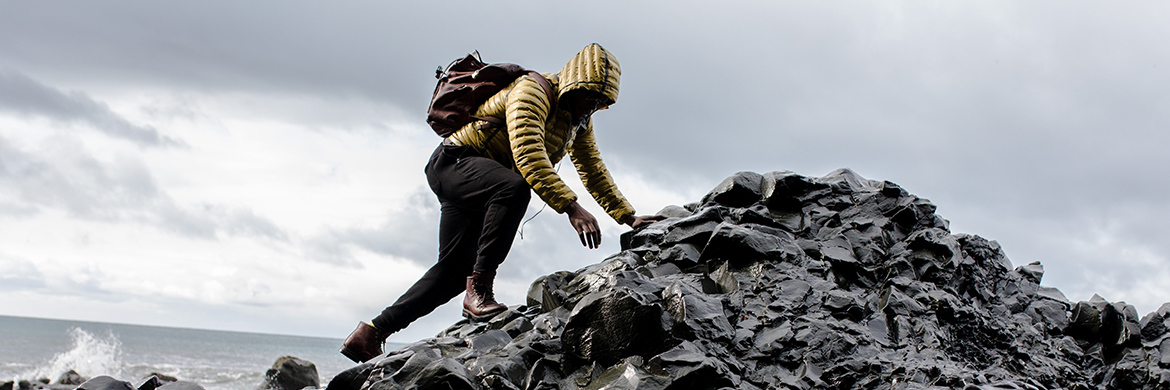
Documentary: Refugees on Lesbos
Source: DW Documentary [Youtube]
News report: Moria refugee camp on Lesbos
Source: EuroNews [Youtube]
News report: Explore changing migrant routes to Europe from 2009 onwards
The most common Mediterranean migration paths into Europe have changed since 2009
About 2 million migrants have arrived in Europe by crossing the Mediterranean Sea since 2009, and the paths they take to get there have changed over time. So far in 2018, the Morocco-to-Spain corridor has been the most traveled among the three major sea routes used by migrants to reach Europe...
Source: Fact Tank - Phillip Connor [Website]
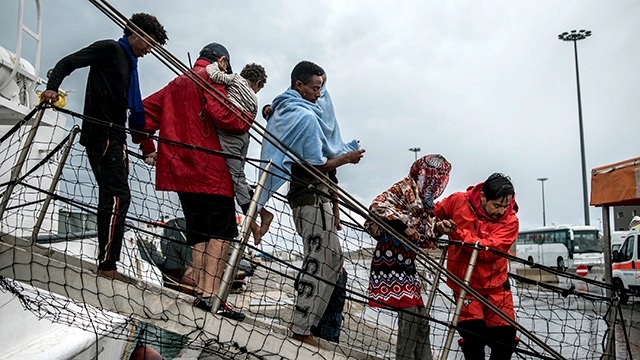
References
[1]Ggia. (2015, October 30). File:20151030 Syrians and Iraq refugees arrive at Skala Sykamias Lesvos Greece 1.jpg. Retrieved May 14, 2019, from https://commons.wikimedia.org/w/index.php?curid=45303282. Wikimedia Commons.
[2]Oxfam Media Briefing [PDF]. (2019, January 9). Oxfam Novib. https://www.oxfamnovib.nl/Files/rapporten/2019/2019-01%20Greece%20media%20briefing_FINAL-embargo%20notice%20(1).pdf
[3]Nye, C., & Sands, L. (2018, August 31). UN urges Greece to act as Moria refugee camp reaches 'boiling point'. Retrieved April 29, 2019, from https://www.bbc.com/news/world-europe-45372942
[4]Tondo, L. (2018, October 03). 'We have found hell': Drawings reveal children's trauma at Lesbos camp | Lorenzo Tondo. Retrieved April 29, 2019, from https://www.theguardian.com/global-development/2018/oct/03/trauma-runs-deep-for-children-at-dire-lesbos-camp-moria
[5]Nye, C., & Sands, L. (2018, August 31). UN urges Greece to act as Moria refugee camp reaches 'boiling point'. Retrieved April 29, 2019, from https://www.bbc.com/news/world-europe-45372942
[6]United Nations High Commissioner for Refugees (UNHCR). Global Trends: Forced Displacement in 2017. 25thof June 2018.
[7]Tondo, L. (2018, October 03). 'We have found hell': Drawings reveal children's trauma at Lesbos camp | Lorenzo Tondo. Retrieved April 29, 2019, from www.theguardian.com/global-development/2018/oct/03/trauma-runs-deep-for-children-at-dire-lesbos-camp-moria
[8]Artsen zonder Grenzen waarschuwt voor problemen op Lesbos. (2015, September 15). Retrieved April 29, 2019, from https://www.nu.nl/bootvluchtelingen/4126364/artsen-zonder-grenzen-waarschuwt-problemen-lesbos.html
[9]Andriotis Konstantios, M. (2019, March 28). The paradigm of Lesvos during the refugee crisis of 2015: Challenges, opportunities, aftermath and current status.Speech presented at Working Conference on Local Responses to Forced Displacement in Vessel 11, Rotterdam.
[10]Kitsantonis, N. (2019, April 05). Rumors of Open Border Prompt Migrant Protests in Greece. Retrieved April 29, 2019, from https://www.nytimes.com/2019/04/05/world/europe/greece-migrant-protest.html?rref=collection/timestopic/Greece
[11]Rossakis, D. (2019, March 28). InBetween cities: Tracing the way to a "European paradise". Speech presented at Working Conference on Local Responses to Forced Displacement in Vessel 11, Rotterdam.
[12]About Us. (n.d.). Retrieved April 29, 2019, from https://www.unhcr.org/about-us.html
[13]The 1951 Refugee Convention. (n.d.). Retrieved April 29, 2019, from https://www.unhcr.org/1951-refugee-convention.html
[14]AYS Daily Digest 21/09/17: What's the UNHCR's role on Lesvos? (2017, September 22). Retrieved April 29, 2019, from https://medium.com/@AreYouSyrious/ays-daily-digest-21-09-17-whats-the-unhcr-s-role-on-lesvos-8442940da207
[15]Pazianou, A. (2018, December 27). Thousands of asylum-seekers moved off Greek islands. Retrieved April 29, 2019, from https://www.unhcr.org/news/latest/2018/12/5c24d1524/thousands-asylum-seekers-moved-greek-islands.html
[16]Pazianou, A. (2018, December 27). Thousands of asylum-seekers moved off Greek islands. Retrieved April 29, 2019, from https://www.unhcr.org/news/latest/2018/12/5c24d1524/thousands-asylum-seekers-moved-greek-islands.html
[17]UNHCR urges Greece to accelerate emergency measures to address conditions on Samos and Lesvos. (2018, November 6). Retrieved April 29, 2019, from https://www.unhcr.org/news/briefing/2018/11/5be15c454/unhcr-urges-greece-accelerate-emergency-measures-address-conditions-samos.html
[18]Common European Asylum System. (2016, December 6). Retrieved May 28, 2019, from https://ec.europa.eu/ome-affairs/what-we-do/policies/asylum_en
[19]EU Turkey Statement Action Plan. (n.d.). Retrieved April 18, 2019, from http://www.europarl.europa.eu/legislative-train/theme-towards-a-new-policy-on-migration/file-eu-turkey-statement-action-plan
[20]Turkey Statement[PDF]. (2016, March 18). Brussels: Council of the EU. https://www.consilium.europa.eu/en/press/press-releases/2016/03/18/eu-turkey-statement/pdf
[21]Karakoulaki, M. (2018, April 11). EU-Turkey deal: The burden on refugees in Greece. Retrieved April 29, 2019, from https://openmigration.org/en/analyses/eu-turkey-deal-the-burden-on-refugees-in-greece/
[22]Kitsantonis, N. (2019, April 05). Rumors of Open Border Prompt Migrant Protests in Greece. Retrieved April 29, 2019, from https://www.nytimes.com/2019/04/05/world/europe/greece-migrant-protest.html?rref=collection/timestopic/Greece
[23]Revision of the Frontex Regulation. (n.d.). Retrieved April 18, 2019, from http://www.europarl.europa.eu/legislative-train/theme-towards-a-new-policy-on-migration/file-revision-of-the-frontex-regulation
[24]Action Plan against Migrant Smuggling. (n.d.). Retrieved April 18, 2019, from http://www.europarl.europa.eu/legislative-train/theme-towards-a-new-policy-on-migration/file-action-plan-against-migrant-smuggling
[25]1stEmergency Relocation Scheme. (n.d.). Retrieved April 18, 2019, from http://www.europarl.europa.eu/legislative-train/theme-towards-a-new-policy-on-migration/file-1st-emergency-relocation-scheme
[26]Kitsantonis, N. (2019, April 05). Rumors of Open Border Prompt Migrant Protests in Greece. Retrieved April 29, 2019, from https://www.nytimes.com/2019/04/05/world/europe/greece-migrant-protest.html?rref=collection/timestopic/Greece
[27]1stEmergency Relocation Scheme. (n.d.). Retrieved April 18, 2019. http://www.europarl.europa.eu/legislative-train/theme-towards-a-new-policy-on-migration/file-1st-emergency-relocation-scheme
[28]2ndEmergency Relocation Scheme. (n.d.). Retrieved April 18, 2019. http://www.europarl.europa.eu/legislative-train/theme-towards-a-new-policy-on-migration/file-2nd-emergency-relocation-scheme
[29]EU-Turkey Statement Action Plan. (n.d.). Retrieved April 18, 2019, fromhttp://www.europarl.europa.eu/legislative-train/theme-towards-a-new-policy-on-migration/file-eu-turkey-statement-action-plan
[30]Worp, M. (2019, March 28). Speech presented at Working Conference on Local Responses to Forced Displacement in Vessel 11, Rotterdam.
[31]Vroom, M. (2019, March 28). Speech presented at Working Conference on Local Responses to Forced Displacement in Vessel 11, Rotterdam.
[32]Vroom, M. (2019, March 28). Speech presented at Working Conference on Local Responses to Forced Displacement in Vessel 11, Rotterdam.
[33]AVO Krimpen aan den IJssel per 1 april bewonersleeg. (2017, February 8). Retrieved April 18, 2019, from https://www.coa.nl/nl/actueel/persberichten/avo-krimpen-aan-den-ijssel-per-1-april-bewonersleeg
[34]Pazianou, A. (2018, December 27). Thousands of asylum-seekers moved off Greek islands. Retrieved April 29, 2019, from https://www.unhcr.org/news/latest/2018/12/5c24d1524/thousands-asylum-seekers-moved-greek-islands.html
[35]Rossakis, D. (2019, March 28). InBetween cities: Tracing the way to a "European paradise". Speech presented at Working Conference on Local Responses to Forced Displacement in Vessel 11, Rotterdam.
[36]EU-Turkey Statement Action Plan. (n.d.). Retrieved April 18, from http://www.europarl.europa.eu/legislative-train/theme-towards-a-new-policy-on-migration/file-eu-turkey-statement-action-plan
[37]Oxenford, Matthuw; Chryssogelos, Angelos (16 August 2018). "Greel Bailout: IMF and Europeans Diverge on Lessons Learnt". Chatham House. Retrieved 20 August 2018.
[38]Dendrinou, V., & Chrysoloras, N. (2018, June 22). Greece's Creditors Agree to Landmark Debt Deal as Bailout Saga Ends. Retrieved April 18, 2019, from https://www.bloomberg.com/news/articles/2018-06-21/greece-s-creditors-agree-landmark-debt-deal-as-bailout-saga-ends
[39]Smith, H. (2018, September 26). Lesbos refugee camp at center of Greek misuse of EU funds row. Retrieved April 18, 2019, from https://www.theguardian.com/world/2018/sep/26/lesbos-refugee-camp-at-centre-of-greek-misuse-of-eu-funds-row
[40]Leape, S. A. (2018, September 13). Greece has the means to help refugees on Lesbos – but does it have the will? Retrieved from https://www.theguardian.com/global-development/2018/sep/13/greece-refugees-lesbos-moria-camp-funding-will
[41]Rossakis, D. (2019, March 28). InBetween cities: Tracing the way to a "European paradise". Speech presented at Working Conference on Local Responses to Forced Displacement in Vessel 11, Rotterdam.
[42]Smith, H. (2017, November 9). Anger rises in Lesbos over crowded refugee camps. Retrieved from https://www.theguardian.com/world/2017/nov/09/anger-rises-in-lesbos-over-crowded-refugee-camps
[43]Kitsantonis, N. (2019, April 05). Rumors of Open Border Prompt Migrant Protests in Greece. Retrieved April 29, 2019, from https://www.nytimes.com/2019/04/05/world/europe/greece-migrant-protest.html?rref=collection/timestopic/Greece
[44]Tourism to North Aegean Islands Recovers in 2018 After Migrant Crisis. (2019, February 8). Retrieved April 18, 2019, from https://news.gtp.gr/2019/02/08/tourism-north-aegean-islands-recovers-2018-migrant-crisis/
[45]Psychosocial Support Team. (n.d.). Retrieved April 18, 2019, from https://bootvluchteling.nl/en/missions/field-team/
[46]Lesvos mayor calls on gov't to decongest island as migrant influx grows. (2017, September 19). Retrieved April 18, 2019, from http://www.ekathimerini.com/221785/article/ekathimerini/news/lesvos-mayor-calls-on-govt-to-decongest-island-as-migrant-influx-grows
[47]Rossakis, D. (2019, March 28). InBetween cities: Tracing the way to a "European paradise". Speech presented at Working Conference on Local Responses to Forced Displacement in Vessel 11, Rotterdam.
[48]Ongoing Criminalization of Refugee Protests – Upcoming trials against migrants on Lesvos. (2019, February 19). Retrieved April 18, 2019, from http://legalcentrelesvos.org/2019/02/19/ongoing-criminalization-of-refugee-protests-upcoming-trials-against-migrants-on-lesvos/
[49]Unprotected, Unsupported, Uncertain: Recommendations to Improve the Mental Health of Asylum Seekers on Lesvos[PDF]. (2018, September). Athens: International Rescue Committee. https://www.rescue.org/sites/default/files/document/3153/unprotectedunsupporteduncertain.pdf
[50]Oxfam Media Briefing [PDF]. (2019, January 9). Oxfam Novib. https://www.oxfamnovib.nl/Files/rapporten/2019/2019-01%20Greece%20media%20briefing_FINAL-embargo%20notice%20(1).pdf
[51]Oxfam Media Briefing [PDF]. (2019, January 9). Oxfam Novib. https://www.oxfamnovib.nl/Files/rapporten/2019/2019-01%20Greece%20media%20briefing_FINAL-embargo%20notice%20(1).pdf
[52]Medical Mission Lesvos. (n.d.). Retrieved April 29, 2019, from https://bootvluchteling.nl/en/missions/medical-team
[53]Ook Oxfam Novib stopt met hulp op Lesbos. (2016, March 24). Retrieved March 18, 2019, from https://www.nu.nl/buitenland/4236089/oxfam-novib-stopt-met-hulp-lesbos.html
[54]About Us. (n.d.). Retrieved April 29, 2019, from https://www.unhcr.org/about-us.html
[55]Medical Mission Lesvos. (n.d.). Retrieved April 29, 2019, from https://bootvluchteling.nl/en/missions/medical-team
[56Interview with EuroRelief Volunteer [Personal interview]. (2019, April 5).
[57]Greece: MSF activity update – December 2017. (2017, December 5). Retrieved April 18, 2019, from https://www.msf.org/greece-msf-activity-update-december-2017
[58]"Lesbos begint steeds meer te lijken op een ouderwets psychiatrisch gesticht". (2018, September 18). Retrieved April 18, 2019, from https://www.msf-azg.be/nl/blog/“lesbos-begint-steeds-meer-te-lijken-op-een-ouderwets-psychiatrisch-gesticht”
[59]Bateman, J. (2018, September 10). Greece: Residents and refugees work together to rebuild Lesbos. Retrieved April 18, 2019, from https://www.dw.com/cda/en/greece-residents-and-refugees-work-together-to-rebuild-lesbos/a-45426014
[60]Expanding our mission to Samos. (2019, April 1). Retrieved April 18, 2019, from https://movementontheground.com/story/expanding-our-mission-to-samos-20514
[61] Smith, H. (2019, February 22). Greece races to move refugees from island likened to a 'new Lesbos'. Retrieved April 18, 2019, from https://www.theguardian.com/global-development/2019/feb/22/greece-races-to-move-refugees-from-island-branded-new-lesbos-samos+ Andriotis Konstantios, M. (2019, March 28). The paradigm of Lesvos during the refugee crisis of 2015: Challenges, opportunities, aftermath and current status.Speech presented at Working Conference on Local Responses to Forced Displacement in Vessel 11, Rotterdam.
[62]EU-Turkey migrant deal 'not working properly': Germany's Merkel. (2019, January 11). Retrieved April 29, 2019, from https://www.reuters.com/article/us-greece-germany-merkel-refugees/eu-turkey-migrant-deal-not-working-properly-germanys-merkel-idUSKCN1P51VX
[63]Rankin, J. (2019, March 06). EU declares migration crisis over as it hits out at 'fake news'. Retrieved April 18, 2019, from https://www.theguardian.com/world/2019/mar/06/eu-declares-migration-crisis-over-hits-out-fake-news-european-commission
[64]FRA work in the 'hotspots'. (n.d.). Retrieved April 29, 2019, from https://fra.europa.eu/en/theme/asylum-migration-borders/fra-work-hotspots
Appendices
Appendix A: A Mental Health Data from Moria, gathered by the International Rescue Committee (IRC)
Source: International Rescue Committee (IRC), September 2018
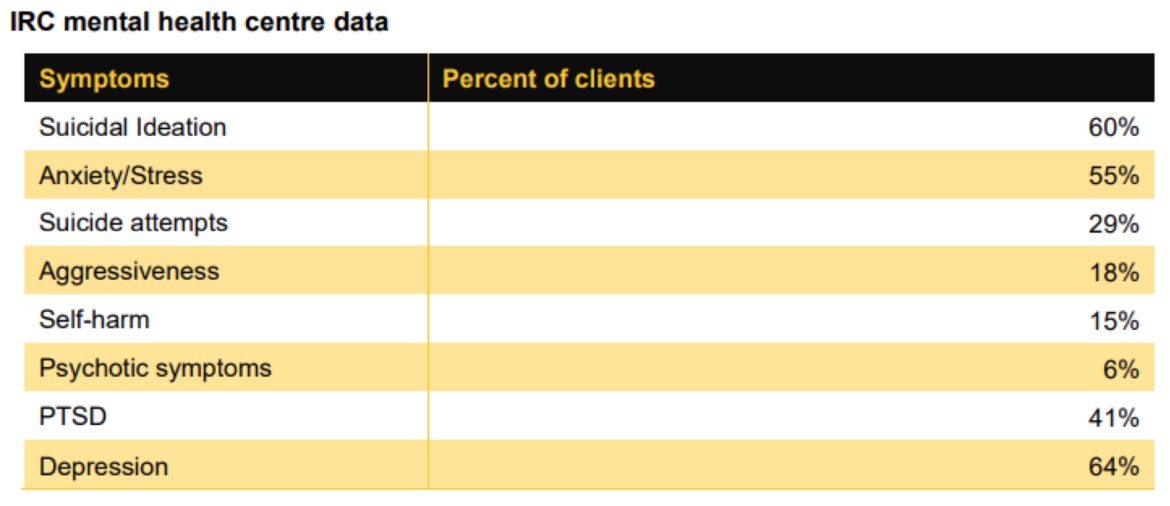
Appendix B: Timeline of Events - Refugees entering Europe from 2015 - 2018
Source: Youtube, Infomigrants
Appendix D: Number of Migrants Arriving versus Number of Migrant Deaths in the Mediterranean Sea
Source: UNHCR
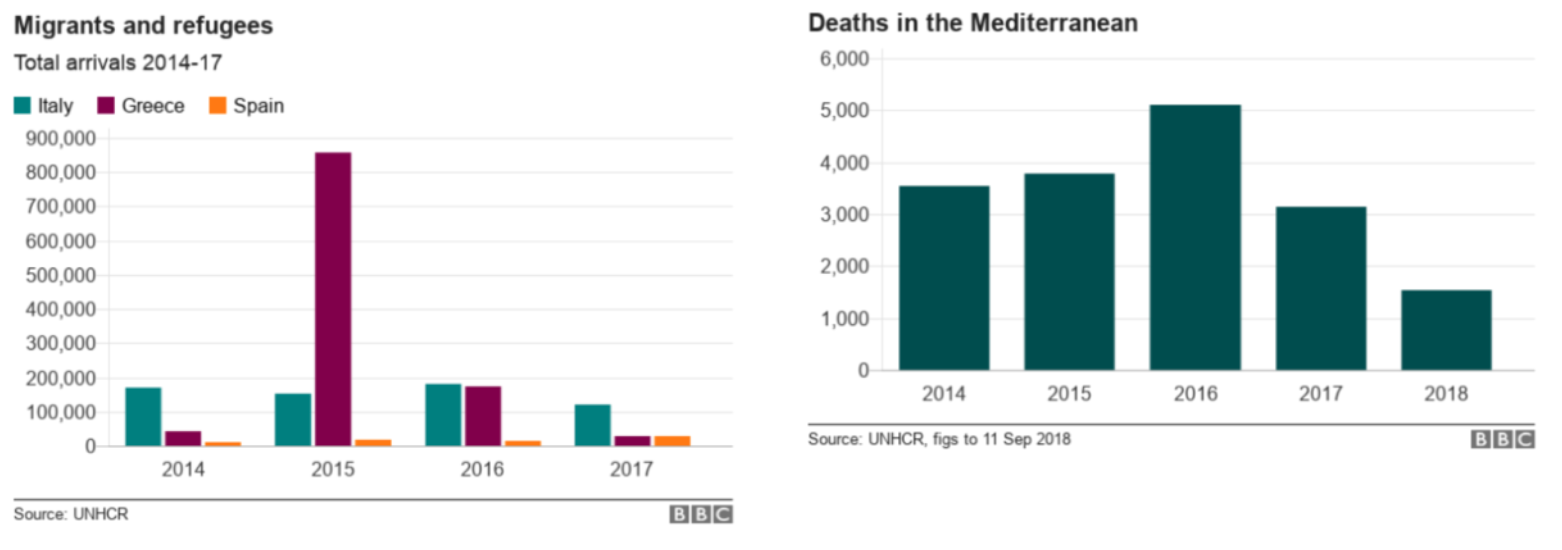
Secured content
Secured content
Teaching note, teaching presentation and teaching videos
